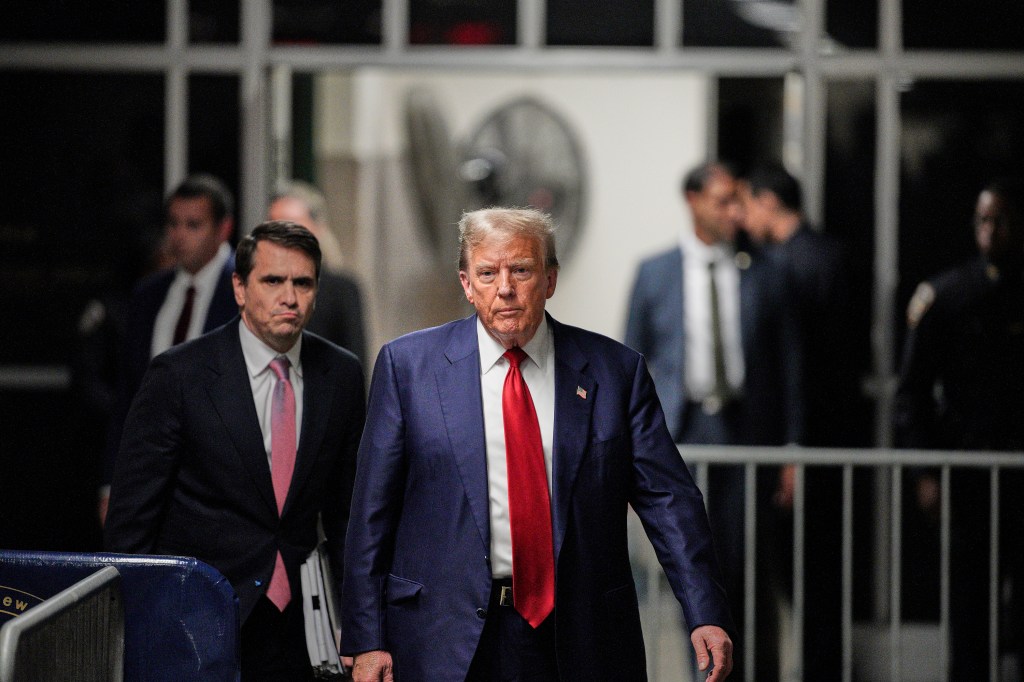Trying to find hypocrisy in political debates is a bit like trying to find a trash bag on a New York City sidewalk. The hard thing is avoiding it. But sometimes the about-face is so brazen and massive that it becomes the equivalent of a garbage barge on Park Avenue.
Since the conservative movement and the Republican Party became wholly owned subsidiaries of the Trump Organization, right-wing advocates have been feverishly devoted to the interests of the 45th president. Lawyers for Donald Trump, who is desperate to evade punishment for trying to overturn his 2020 defeat, argue that he enjoys absolute immunity from criminal prosecution for actions taken in the exercise of his office.
They’ve gone so far as to insist that if the president ordered a SEAL team to give his rival the Osama bin Laden treatment, he could not be prosecuted unless he was first impeached and convicted. Of course, if that were true, he could also order the assassination of any members of Congress who dared to consider removing him from office, which would put the kibosh on that possibility.
Most conservatives show no alarm at these prospects. Eighteen Republican state attorneys general have filed a brief with the Supreme Court in support of Trump. No fewer than 27 congressional Republicans signed on to one endorsing his claim to immunity. Republican U.S. Sens. Josh Hawley of Missouri and Lindsey Graham of South Carolina favor giving the president a license to run amok. Few, if any, Republican officials have dared to disagree.
As usual, the opinion pages of The Wall Street Journal offer a showcase for conservatives engaging in tortured rationalizations of whatever their leader wants. David B. Rifkin Jr. and Elizabeth Price Foley argue that “immunity for official actions is a necessary part of the constitutional structure.” In their view, “a president threatened with prosecutions for official acts couldn’t exercise his duties with full vigor.”
The newspaper’s editorial board likewise sides with Trump, accusing the Justice Department of “using lawfare to defeat a political opponent” and contending that “a President needs to be free to make controversial decisions without having to worry that he’ll be prosecuted for them after he leaves office.” The same editorial gingerly conceded that “he shouldn’t be free to commit crimes that are unrelated to the office” — while refusing to admit that Trump did any such thing.
But this is not the first time that the courts have had to consider whether presidents should have any sort of legal immunity. The issue came up in 1996, when Democrat Bill Clinton occupied the White House.
He was sued by Paula Jones, who accused him of sexually harassing her in a particularly gross manner when he was governor of Arkansas and she was a state employee. His lawyers, citing the demands of the presidency, said he should not be subject to a civil trial while he is in office.
Back then, conservatives universally scorned the notion that Clinton should get a break. Michael Barone, writing in the conservative magazine The Weekly Standard, found it “preposterous for the chief executive of a republic to claim the sovereign immunity of a king or queen.”
An editorial in, yes, The Wall Street Journal, took a similar view, asking, “Are the Clintons simply above the laws that govern all the rest of us?”
Keep in mind that Clinton’s claim was far less audacious than Trump’s. He didn’t request immunity for all time — only until his term was up, at which point he could be hauled into court.
Nor was he asserting the right to carry out felonies without fear. The Jones case was a civil one, exposing Clinton only to monetary damages. Trump, by contrast, insists that a president should be free to commit crimes — even murder — without ever answering for them. The willingness of conservatives to justify Trump’s claim after condemning Clinton’s can be described only as a titanic case of hypocrisy.
You might assume that Trump’s critics are equally hypocritical. In fact, the American Civil Liberties Union filed a brief rejecting Clinton’s claim — just as it did with Trump’s. The liberal New York Times editorial board has also been consistent. “No citizen — not even a sitting President — is above the law,” it said in 1997, a position it has reiterated in regard to Trump.
Oh, and I wrote a column in the Tribune arguing that “one of the glories of American democracy is that the president, unlike princes and potentates of yore, is subject to the same laws as his lowliest constituent.” The Supreme Court unanimously agreed.
The Republican Party and its allies once upheld the principle that presidents should be accountable under the laws of the land. But now their philosophy about principles resembles Kristi Noem’s philosophy about dogs: Don’t get too attached, and kill them off when they give you trouble.
Steve Chapman was a member of the Tribune Editorial Board from 1981 to 2021. His columns, exclusive to the Tribune, appear the first Thursday of every month. He can be reached at stephenjchapman@icloud.com.


